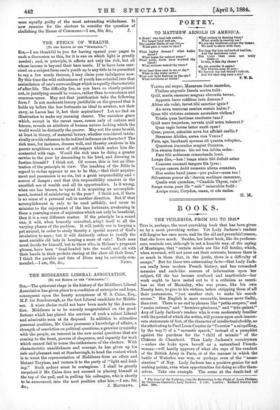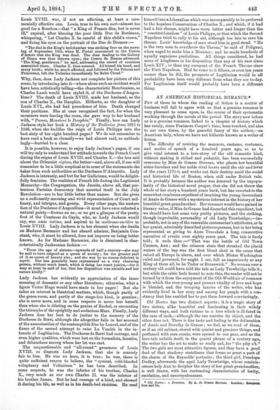BOOKS.
THE TUILERIES, FROM 1815 TO 1848.*
Tan is, perhaps, the most provoking book that has been .given us by a most provoking writer. Yet Lady Jackson's readers will forgive her once more, and for the old and proverbial reason,. that she loves much. Besides, her latest book, like its predeces- sors, reminds one, although in not a humble way, of the saying of Montaigne, that "certain minds are like full bottles, which, when reversed, will not pour out their contents, because there is so much in them that, in the jostle, there is a difficulty of escape?' But for these two extenuating facts—that Lady Jack- son really loves modern French history, and has ransacked. memoirs and such-like sources of information upon her subject, till she has become confused and inarticulate—her work ought to have meted out to it a criticism as merci- less as that of Macaulay, who was prone, like his own, Naseby hero, to give to his victims, before stripping them of all their pretensions, "just another stab, to make his search secure." Her English is more execrable, because more Gallic,. than ever. There is no end to phrases like "petits soupers," and " amies intimes," and " fermiers-generaux," and " tres-galant.' Any of Lady Jackson's readers who is even moderately familiar with the period of which she writes, will pounce upon such inaccu- rate statements of fact, of the character of intellectual shoddy, as the attributing to Paul Louis Courier (is " Courrier " a mispelling, by the way P) of a "sarcastic speech," instead of a pamphlet against the purchase for the "child of miracle" of the- Chateau de Chambord. Then Lady Jackson's count:ye:ten —unless she lc.:oks upon herself as a naturalised French- woman—will hardly approve of what she says of the conduct of the British Army in Path, or of the manner in which the battle of Waterloo was won, or perhaps even of the " assas- sination " of Ney. Lady Jackson has a positive genius for not making points, even when opportunities for doing so offer them- selves. Take one example. The scene at the death-bed of • 27as Court of the Tuileries, I rem the Restoration to the Might of Louis Philippe.. By Catherine Charlotte, Lady Jackson. 2 vols. London : Richard Bentley and, Bon. 1884.
Louis XVIII. was, if not an affecting, at least a cere- monially effective one. Louis, true to his own mot—almost too good for a Bourbon—that " a King of France dies, but is never ill," expired, after blessing the poor little Due de Bordeaux, whispering, "Let Charles X. be careful of this child's crown," and fixing his eyes on the portrait of the Due de Decazes :—
"The dial in the King's bedchamber was striking four on the morn- ing of September 16th, when M. Portal announced to the Comte d'Artois that the King was dead. The door leading to the Gallery of Diana was then thrown open ; the Comte de Damas advanced. 4 The King, gentlemen !' he said, addressing the crowd of courtiers assembled there. Charles X. then entered. All kissed his hand, and many knelt ; while he, much affected, and followed by the Princes and Princesses, left the Tnileries immediately for Saint Cloud."
Why, then, does Lady Jackson not complete her picture of this scene, by introducing into it—where alone such an incident would have been artistically telling—the characteristic Bourbonism, as Charles Lamb would have styled it, of the Duchesse d'Angou- 16me P The death of Louis XVIIL made her husband, as the son of Charles X., the Dauphin. Hitherto, as the daughter of Louis XVI., she had had precedence of him. Death changed
their positions. She at once recognised the fact, for when the mourners were leaving the room, she gave way to her husband -with, "Passes, Monsieur is Dauphin." Finally, how can Lady -Jackson style her book a History of the Tuileries from 1815 to 1848, when she huddles the reign of Louis Philippe into the last sixty of her eight hundred pages ? We do not remember to have read a book so clumsily—we had almost said, so unblush-
ingly—hurried to a close.
It is possible, however, to enjoy Lady Jackson's pages, if one -will try only to understand her attitude towards the French Court -during the reigns of Louis XVIII. and Charles X.—the less said about the Orleanist regime, the better—and, above all, if one will remember to be a little sceptical as to some of the statements she takes from such authorities as the Duchesse D'Abrantes. Lady
Jackson is intensely, and but for her Gallicisms, would be delight- fully feminine. The realities of French life daring the Legitimist
_Monarchy—the Congregation, the Jesuits, above all, that por- tentous Parisian democracy that asserted itself in the July Revolution—are to her little better than names. But she gives as a sufficiently amusing and vivid representation of Court mil- linery, and intrigue, and gossip. Every other page, the austere face of the Duchesse d'Angonleme—it must have once reflected a natural gaiety—frowns on us ; or we get a glimpse of the pretty foot of the Comtesse du Cayla, who, as Lady Jackson would say, was amie intime, and aspired to be maitresee-en-titre to Louis XVIII. Lady Jackson is in her element when she dwells on Madame Recamier and her absurd admirer, Benjamin Con- stant, who, it must be allowed, does not improve on being better
known. As for Madame Recamier, she is dismissed in char- acteristically Jacksonian fashion :—
"From the age of sixteen—upwards of half a century—she may be said to have reigned as a queen of society ; for the greater part Lady Jackson has evidently no appreciation of the inner meaning of dramatic or any other literature; otherwise, what a figure Victor Hugo would have made in her pages ! But she -takes an interest in theatrical matters, which, though partly of the green-room, and partly of the stage-box kind, is genuine ; she is never more, and in some respects is never less herself, than when she is dilating on the genius of Rachel, or recounting -the triumphs of the sprightly and audacious Mars. Finally, Lady Jackson does her best to do justice to the memory of the Duchesse de Berri, although she altogether fails in her account .of the assassination of the contemptible Due by Louvel, and of the fiasco of the second attempt to raise La Vendee in the in- terests of Legitimism. The Duchesse de Berri had courage, and even higher qualities, which were lost on the formalists, fanatics, and debauchees among whom her lot was cast. The unquestionable and " all-round " grossness of Louis XVIII. so disgusts Lady Jackson, that she is scarcely fair to him. He was no hero, it is true ; he was, there is quite sufficient reason to believe, the "cynical, cold-blooded -voluptuary and Voltairean " he has been described. In some respects, he was the inferior of his brother, Charles X., very much as our own Charles EL was the inferior of his brother James. But he had courage of a kind, and showed it during his life, as well as in his death-bed stoicism. He read himself into a Liberalism which was incomparably to be preferred to the hopeless Conservatism of Charles X., and which, if it had had a fair chance, might have worn better and longer than the " constitutionalism " of Louis Philippe, or that which the Second Napoleon tried to rally to his aid, although too late to save his throne. Louis' knowledge of men stood him in good stead. "He is the very man to overthrow the Throne," he said of Polignac, when urged to make him a Minister ; and he made hundreds of equally sagacious predictions. All things considered, he had more of kingliness in his disposition than any of his race since Louis XIV., or than any occupant of the• French Throne since the First Napoleon. Had he come to it fifteen, or even ten years sooner than he did, the prospects of Legitimism would in all probability have been very different from what they are to-day. For Legitimism itself would probably have been a different thing.















































 Previous page
Previous page